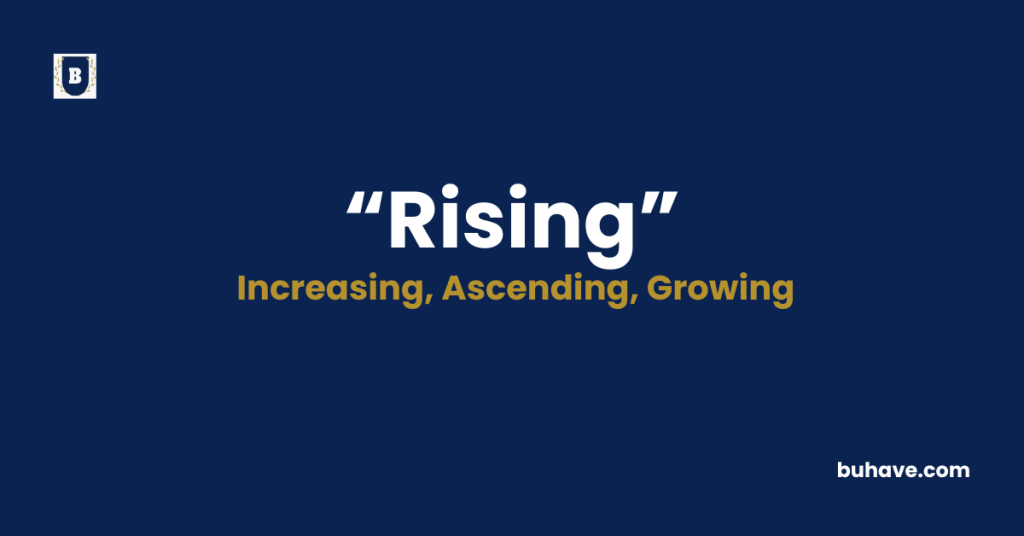The word ‘Rising’ (Adjective) refers to something that is going up, increasing, or moving upward in position, status, or intensity. It can describe everything from physical elevation to emotional growth, social advancement, or trends that are gaining momentum. In this complete guide, you’ll learn the full meaning, expanded definition, rich etymology, real-life examples, synonyms, antonyms, and answers to common questions about how to use the word “Rising” correctly and effectively in sentences.
Rising Explained in Depth
A complete and detailed guide to the words Rising including meaning, definition, examples, etymology, synonyms, and antonyms.
Meanings of Rising
Rising generally means moving upward or increasing in level. This can apply to tangible things like the rising sun, rising water levels, or rising smoke but it’s also used metaphorically. A rising star refers to someone whose popularity or success is quickly growing. A “rising trend” points to something becoming more popular or widespread.
The word often expresses growth, progress, or elevation. It suggests an upward trajectory whether that’s in temperature, emotion, influence, price, or position. For example, when someone says rising tension, they mean emotions or conflict are intensifying. If prices are rising, they’re going up. It’s a versatile word used in many contexts: natural, emotional, economic, political, or personal.
Definition
Rising refers to something that is going upward, increasing, or becoming more prominent or important over time. when you say something is rising, you’re usually talking about a positive movement or growth. For instance, if someone is a rising star, they are becoming more popular or successful. If prices are rising, they’re going up. Similarly, when the sun is rising, it’s moving up into the sky at the start of a new day.
So, to put it simply: rising means moving upward, gaining strength, or showing progress whether it’s a person, a number, or even the sun.
Etymology
The word “rising” originates from the verb “rise,” which has deep historical roots in the English language. “Rise” comes from the Old English word rīsan, meaning “to get up, rise, or go upwards.” This, in turn, comes from the Proto-Germanic *rīsanan, which also meant “to climb or rise.” It’s related to Dutch rijzen and German reisen (“to rise” or “to travel”).
Over time, the word “rise” evolved to encompass physical, social, emotional, and metaphorical senses of upward movement. “Rising” became its present participle, meaning something in the act of ascending, increasing, or improving. From the rising sun to a rising tide of public opinion, the word has consistently symbolized progress, hope, or even transformation. Its modern uses preserve this connection to upward motion, both literal and symbolic.
Example Sentences
- The rising sun painted the sky with shades of orange and gold.
- She is a rising talent in the world of classical music.
- Rising temperatures are a major concern for climate scientists.
- The community felt the rising tension during the debate.
- He took advantage of the rising demand for eco-friendly products.
Rising Synonyms
- Ascending
- Soaring
- Increasing
- Climbing
- Emerging
- Growing
- Uplifting
- Escalating
- Advancing
- Elevating
Rising Antonyms
- Falling
- Descending
- Declining
- Lowering
- Diminishing
- Sinking
- Dropping
- Collapsing
- Receding
- Subsiding
FAQs about Rising
Here are some frequently asked questions (FAQs) about the word “Rising”
1. Can “rising” be used to describe a person?
Yes. “Rising” is often used to describe someone who is quickly becoming more successful or influential. For example, “a rising entrepreneur” or “a rising political leader.”
2. Is “rising” always positive?
Not necessarily. While it often carries a positive tone (growth, success), it can also be neutral or negative depending on context. For instance, “rising tension” or “rising inflation” are generally undesirable.
3. What’s the difference between “rising” and “raising”?
“Rising” is intransitive it doesn’t take a direct object. Something rises on its own. “Raising” is transitive it needs a direct object. For example: “The sun is rising” vs. “She is raising her hand.”
4. Can “rising” be used in business?
Yes. In business, you might hear about “rising profits,” “rising market share,” or a “rising startup,” all indicating growth or success.
5. Is “rising” only used in the present tense?
“Rising” is the present participle form of “rise.” It’s used in continuous tenses (e.g., “is rising”) or as an adjective (e.g., “a rising star”).

















